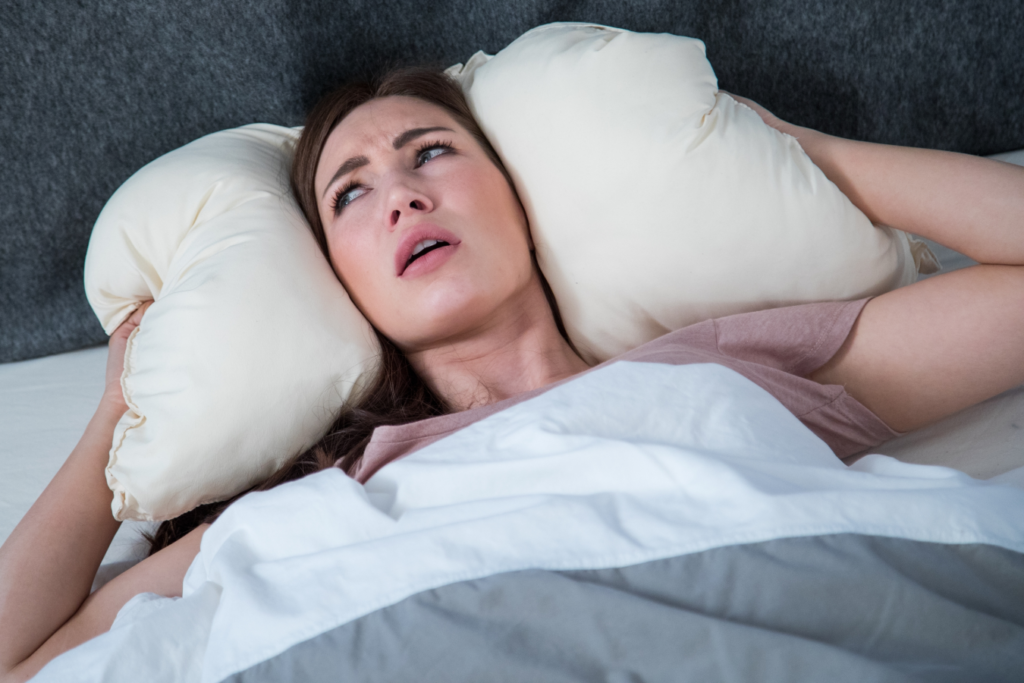Falling asleep even when tired is not easy for everyone and sounds have a very individual effect.
Putting on your pajamas, getting into bed, turning off the light… and falling into the deepest sleep. Unfortunately, falling asleep is not so easy for many people. When there are disturbing noises, it can be very difficult to fall asleep. Why does this happen? And what do you do when there is a street party under your bedroom window or your partner snores?
“Of course, it depends on what noises we are talking about,” says Eva-Maria Elmenhorst from the German Aerospace Center (DLR) in Cologne. Noise during sleep can accelerate the heartbeat and brain waves. That is why it can easily wake us up, especially during the phase of falling asleep, says the physiologist, who researches sleep and mental performance.
It is important to distinguish whether the noise is heard continuously or irregularly. The ticking of a clock or snoring, for example, is more annoying than the whistling of an air conditioning unit.
According to Elmenhorst, the so-called sound pressure level, which measures the intensity of the noise, also plays a role. It depends on how much the noise stands out in the environment. The noisier our surroundings are, the quieter we perceive a new stimulus.
The surprise effects of noise are negative
The specialist explains that it is also important how suddenly a sound appears. According to Elmenhorst, people are more likely to wake up to surprising sounds than to sounds that gradually become louder.
Apart from that, sounds have a very individual effect, according to the expert. Studies on traffic noise show that almost everyone wakes up at 65 decibels. But those who are very tired can fall asleep even in louder environments. “We know that some young people fall asleep at night in a disco, even if it is incredibly loud,” she adds.
The role of the psyche
According to Karl-Heinz Ladwig from the Technical University of Munich, personal attitudes towards noise also play an important role. “People can react very differently to a particular noise stimulus, depending on how they evaluate the stimulus,” says the professor of psychosomatic medicine and medical psychology.
As a fictitious example, the stress researcher mentions a father who dozes off in the garden despite the children playing loudly. The father integrates the children’s noise into his sleep as a positive stimulus pattern because it tells him that everything is going well.
This can also have the opposite effect, as noise and the people who make it create a negative impression on you, causing your attention to focus on the noise, says Ladwig. This makes the noises even more amplified.
In any case, persistent and annoying noise during sleep can be a toxic phenomenon that is harmful to health and especially to the cardiovascular system.
Tips and tricks for relaxing
People affected by the noise can use various strategies to cope with it at bedtime. According to Ladwig, it is important to relax. To do this, he recommends a breathing exercise in which you take seven slow breaths in succession and let the air out noisily through your lips. This lowers blood pressure.
Both Ladwig and Elmenhorst advise reducing the source of noise as much as possible, either with earplugs or simply by closing doors and windows. They also point out that music or audiobooks can be helpful, as they relax and distract.
Some people like to listen to “ white noise” to help them fall asleep in noisy environments. However, according to Elmenhorst, there is still no definitive data available on its effects. Some studies suggest that such noises have a beneficial effect because they drown out other, more disturbing noises. Other studies believe that they also have negative aspects. “You have to enjoy this type of noise with caution,” says the doctor.
In general, he recommends using this type of remedy in exceptional cases and for a short period, so as not to develop an addiction. On the other hand, poor sleep hygiene should be avoided.
Specifically, this means that the bed should only be used for sleeping, and not for eating or watching television. Sports should also be avoided shortly before going to sleep and a heavy dinner should not be eaten. In addition, blue light emitted by tablet or mobile phone screens should be avoided.
The last coffee should be taken about six hours before going to bed, while alcohol before bed is also not a good idea. Although it initially makes you sleepy, it causes you to wake up earlier or more often during the night.

